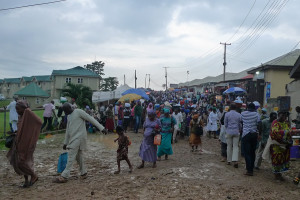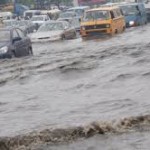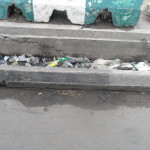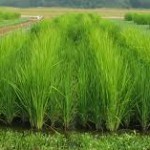“Òjò ibùkún lọ́dọ̀ ẹni kan, ni òjò ìbànújẹ́ lọ́dọ̀ ẹlòmíràn”. Lai si òjò, ọ̀gbẹlẹ̀ á wà, ọ̀gbẹlẹ̀ pi pẹ́ ló nfa iyàn. Inú àgbẹ̀ ma ndun ni àsikò òjò nitori wọn mọ̀ pé ohun ọgbin wọn yio hù, oúnjẹ àti jẹ, àti tà yio pọ̀ si. Ọmọdé àti àgbà ló fẹ́ràn òjò nitori ó mú ìtura wá, pàtàki ni igbà ooru.
Ni idà keji, òjò àrọ̀-irọ̀ dá lè fa ìbànújẹ́ fún àgbẹ̀ àti ará ilú, pàtàki fún; ẹni ti ilé rẹ njò, ẹni ti ó kọ́lé si ọ̀nà àgbàrá òjò, ó nfá ẹ̀fọn/yànmùyánmú eyi ti ó nfá ibà, àgbàrá lè gbá ohun ọ̀gbìn lọ, agbara lè yalé àti bẹ ́ẹ̀ bẹ́ ẹ̀ lọ. Fún àpẹrẹ, irònú àti ibànújẹ́ ni ìgbà òjò jẹ́ fún ọ̀pọ̀lọpọ̀ ará ilú Èkó, nitori ọ̀nà fún àgbàrá kò tó, eyi ma njẹ ki àgbàrá ba ilé àti ọ̀nà jẹ́. Ni Ibadan, irònú na a dé fún àwọn ti ó kọ́lé si ẹ̀gbẹ́ odò Ògùnpa nitori ìbẹ̀rù omi-yalé.
- Àgbàrá òjo – Flooded Road
- Ẹ̀gbin ninú kòtò àgbàrá – Dumped refuse in shallow open drainage
- Oko ìrẹsì – Rice Farm
Ọ̀rọ̀ Yorùbá ni “Òjò kò bẹni kan ṣọ̀tá, ẹni eji ri leji npa”. ọ̀pọ̀lọpọ̀ igbà, òjò kò rọ̀ fún ìbànújẹ́ èniyàn pàtàki bi èniyàn bá palẹ̀mọ́ fún òjò nipa ti tú àyíká ṣe lai kó pàntí si ọ̀nà àti ojú àgbàrá àti gbi gbẹ́ ọ̀nà fún àgbàrá. Òwe Yorùbá sọ wipé “Òjò tó rọ̀ ló mú pẹ̀tẹ̀pẹ́tẹ̀ wá”. Pẹ̀tẹ̀pẹ́tẹ̀ dára fún ohun ọ̀gbin bi ìrẹsì àti fún agbo Ẹlẹ́dẹ̀ ṣùgbọ́n kò yẹ ilú. Bi Ìjọba bá ṣe ọ̀na fún ọkọ̀ àti ẹlẹ́sẹ̀, pẹ̀tẹ̀pẹ́tẹ̀ á din kù. Eyi ti ó ṣe pàtàki ni ki Ìjọba àti ará ilú sowọ́pọ̀ lati tú agbègbè àti àyíká ṣe lati lè lo òjò fún rere.
ENGLISH TRANSLATION
“What some regarded as rain of blessing can be regarded as rain of sorrow for others”. Without the rain, there will be drought, long time drought leads to famine. Farmers are happy during raining season because the crops will grow and this would lead to good harvest, plenty of food to eat and to sell. Children and adults alike love the rain because it eases out the heat.
On the other hand, continuous downpour could cause havoc for both the farmers and city dwellers alike, particularly for; those with leaking roof, those who built along the drainage way or canal, it aids mosquito breeding that causes Malaria or Fever, flood can sweep away farmland and properties etc. For example, raining season brings about fear and sadness for Lagos people, because of lack of adequate drainage system, hence the destruction of Homes and properties as well as the Roads by flooding. In Ibadan, fear often come upon people who built their Houses around Ogunpa River, as a result of fear of flooding.
According to Yoruba adage meaning “Rain is no enemy to anyone, it falls on everyone along its path”. Oftentimes, rainfall is not meant to cause sorrow for people if one is adequately prepared by taking care of ones surrounding by clearing refuse from the road and drainages and building more gutters and canals to contain flood. Another Yoruba proverb said “The rain that fell brought about much mud”. Mud is good for some food crops such as Rice plantation and also for Piggery but it is not befitting for the city. The menace of mud will be reduced if the Government can provide good road network for both vehicular and pedestrian movement. The most important solution is for both the Government and the people to work in tandem to care for the environment and neighbourhood in order to put the rain to good use.
Originally posted 2015-06-09 13:56:48. Republished by Blog Post Promoter






